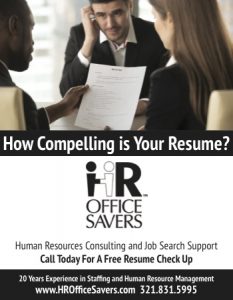by, Alan Bernstein, President HR Office Savers
I speak with many small business owners who are unfamiliar with the basics of human resource compliance. Failing to meet your minimum workplace labor obligations can be unlawful or illegal and can lead to disputes, fines or legal claims.
 Here are three HR compliance basics for every business owner.
Here are three HR compliance basics for every business owner.
Labor Posters
Post appropriate workplace labor and employment law posters to ensure compliance with federal, state and local requirements.
The posters must be in plain sight, displayed in a conspicuous place where they are easily visible to all employees and in some cases applicants for employment.
Pro-tip: Check the US Department of Labor FirstStep Poster Advisor for specific posters you may have to display.
Employee Handbook
Your employee handbook serves two important purposes: letting your employees know what you expect of them and protecting your business in case there is a dispute.
There is no one way to write a handbook, and there are plenty of free templates online. Try to find one that allows you to customize your handbook to your business, culture, and long-term strategy.
Pro-tip: Have the employee sign an acknowledgment of receipt of the handbook and save a copy in the employee’s file.
Employee Files
Create and manage separate files for each employee in your business. At a minimum, store all new hire paperwork such as resume, offer of employment, emergency contact form, job description, and W-4. If you have an employment contract or written agreement, save that here too.
You should also, save ongoing employment documentation such as performance reviews and payroll records. All this can be a paper file or electronic. Just be sure you save it.
Additionally, and required by law, you must complete a federal I-9 form for every employee. These should be kept together in a separate folder. Check USCIS.gov for the most up to date form.
Pro-tip: Employee file documents typically contain private information like social security numbers that should be locked in a secured file cabinet or electronic folder with limited access.
In Conclusion
Federal, state, and local government regulations, laws, and reporting requirements change constantly. Keep abreast of employment laws and regulations to ensure you are staying compliant.
Alan is the owner of HR Office Savers, Inc., an independent human resource consulting firm that supports small local businesses and individuals with their human resource needs, including staffing, compliance, and job search. Prior to launching his business, Alan held a series of Human Resource positions of increased responsibility at Harris Corporation, Honeywell International, GTSI Corp, and Verizon Wireless. Alan holds a bachelor’s degree in Psychology from The University of Buffalo, is Six Sigma Green Belt Certified, and is a Senior Certified Professional with the Society of Human Resource Management.
HR Office Savers offers a full range of human resource support options, from annual checkups to on-site HR support, including writing employee handbooks and policy manuals. Contact us today at www.HROfficeSavers.com.
Promoting positive and sustained employment for both workers and employers!








